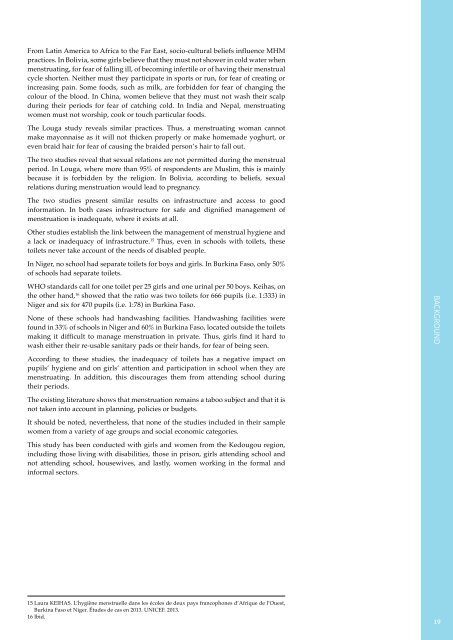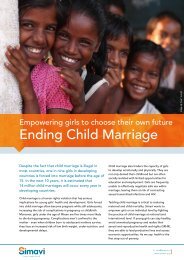The issueThere is very little qualitative or quantitative data available on menstrual hygienemanagement in Africa, and in Senegal in particular. At regional level, there have beensome recent studies on menstrual hygiene management in schools, 12 for example inBurkina Faso and Niger. It is much harder to find studies or research on how thisaffects women of all ages inside and outside schools, at the workplace and at home.Menstrual hygiene information is not regarded as important in either health oreducation establishments in Senegal. Yet women and girls account for more than50% of WASH service users and also have de facto responsibility for managingwater, hygiene and sanitation services. It is indeed strange that these services failto articulate or meet the specific needs of half of the population that has regularperiods and requires access to information, water, soap and detergent, washingfacilities and menstrual waste management options. Women and girls are forced tomanage silently, without anyone knowing and are ill equipped to do so. This natural,biological function is shrouded in shame and silence. It is against this backgroundthat the Joint Programme on Gender, Hygiene and Sanitation emerged as an initiativebetween two United Nations bodies: UN Women and WSSCC.The Programme’s overall aim is to accelerate the development of policies andpractices that promote equality and the human right to water, hygiene and sanitationfor women and girls in West and Central Africa. The Programme focuses in particularon menstrual hygiene as an entry point to public policies, budgets and monitoringsystems that better reflect the specific needs of women and girls different from thoseof men and boys. It aims to also improve practice on the ground so that facilities aremore appropriately designed, constructed and maintained to respond to the needs ofwomen and girls inside and outside the home.BackgroundLiterature reviewThere is little literature on the management of menstrual hygiene. Most studies inthis area are limited to schools and relate to girls.Among these, the study conducted for UNICEF by Long J. and Caruso B on water,hygiene and sanitation in schools in Bolivia 13 reveals the fear and shame experiencedby the pupils surveyed during their periods.These feelings are even manifested bya change in classroom behaviours. “They are less dynamic and do not have fun likethey do in normal times.” Teachers and mothers testified to girls’ “well-behaved,calm” attitude at these times, admitting their difficulty in discussing this matterwith their pupils/daughters.In West Africa, as in Bolivia, girls face many difficulties over the management of theirmenstrual hygiene, including the use of absorbent materials. A study conductedby WSSCC and UN Women in the region of Louga, Senegal 14 shows that sanitarynapkins and cloths are the most commonly used materials for the management ofmenstruation. Some women, mainly those living with disabilities, also use sponges(the stuffing of mattresses).1812 L’hygiène menstruelle dans les écoles de deux pays francophones d’Afrique de l’ouest : Burkina Fasoet Niger, études de cas en 2013, UNICEF 2013 – WASH in schools empowers girls education in ruralCochabamba, Boliva – an assessment of Menstrual Hygiene Management in schools, UNICEF 2012.13 WASH in Schools Empowers Girls’ Education in Rural Cochabamba, Bolivia: An Assessment of MenstrualHygiene Management in Schools, UNICEF, 2012.14 Gestion de l’hygiène menstruelle : Comportements et pratiques dans la région de Louga, Sénégal.(Menstrual Hygiene Management: Behaviours and Practices in the Louga Region, Senegal.) WSSCC/UN Women, 2014.
From Latin America to Africa to the Far East, socio-cultural beliefs influence MHMpractices. In Bolivia, some girls believe that they must not shower in cold water whenmenstruating, for fear of falling ill, of becoming infertile or of having their menstrualcycle shorten. Neither must they participate in sports or run, for fear of creating orincreasing pain. Some foods, such as milk, are forbidden for fear of changing thecolour of the blood. In China, women believe that they must not wash their scalpduring their periods for fear of catching cold. In India and Nepal, menstruatingwomen must not worship, cook or touch particular foods.The Louga study reveals similar practices. Thus, a menstruating woman cannotmake mayonnaise as it will not thicken properly or make homemade yoghurt, oreven braid hair for fear of causing the braided person’s hair to fall out.The two studies reveal that sexual relations are not permitted during the menstrualperiod. In Louga, where more than 95% of respondents are Muslim, this is mainlybecause it is forbidden by the religion. In Bolivia, according to beliefs, sexualrelations during menstruation would lead to pregnancy.The two studies present similar results on infrastructure and access to goodinformation. In both cases infrastructure for safe and dignified management ofmenstruation is inadequate, where it exists at all.Other studies establish the link between the management of menstrual hygiene anda lack or inadequacy of infrastructure. 15 Thus, even in schools with toilets, thesetoilets never take account of the needs of disabled people.In Niger, no school had separate toilets for boys and girls. In Burkina Faso, only 50%of schools had separate toilets.WHO standards call for one toilet per 25 girls and one urinal per 50 boys. Keihas, onthe other hand, 16 showed that the ratio was two toilets for 666 pupils (i.e. 1:333) inNiger and six for 470 pupils (i.e. 1:78) in Burkina Faso.None of these schools had handwashing facilities. Handwashing facilities werefound in 33% of schools in Niger and 60% in Burkina Faso, located outside the toiletsmaking it difficult to manage menstruation in private. Thus, girls find it hard towash either their re-usable sanitary pads or their hands, for fear of being seen.BackgroundAccording to these studies, the inadequacy of toilets has a negative impact onpupils’ hygiene and on girls’ attention and participation in school when they aremenstruating. In addition, this discourages them from attending school duringtheir periods.The existing literature shows that menstruation remains a taboo subject and that it isnot taken into account in planning, policies or budgets.It should be noted, nevertheless, that none of the studies included in their samplewomen from a variety of age groups and social economic categories.This study has been conducted with girls and women from the Kedougou region,including those living with disabilities, those in prison, girls attending school andnot attending school, housewives, and lastly, women working in the formal andinformal sectors.15 Laura KEIHAS. L’hygiène menstruelle dans les écoles de deux pays francophones d’Afrique de l’Ouest,Burkina Faso et Niger. Études de cas en 2013. UNICEF. 2013.16 Ibid.19



